完整版专四英语语法考点教学内容
- 格式:doc
- 大小:85.00 KB
- 文档页数:16

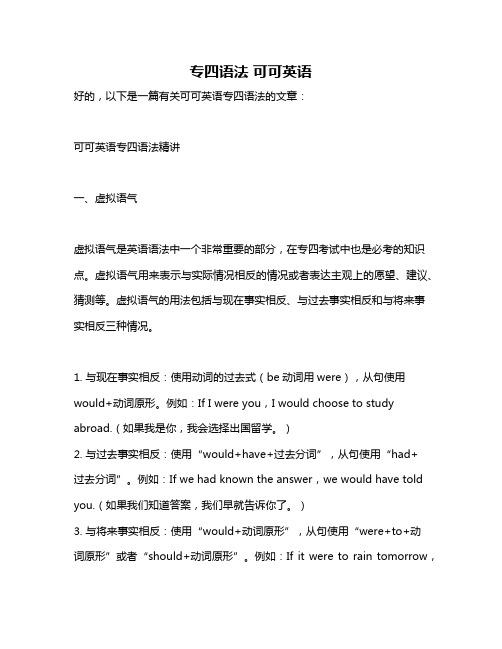
专四语法可可英语好的,以下是一篇有关可可英语专四语法的文章:可可英语专四语法精讲一、虚拟语气虚拟语气是英语语法中一个非常重要的部分,在专四考试中也是必考的知识点。
虚拟语气用来表示与实际情况相反的情况或者表达主观上的愿望、建议、猜测等。
虚拟语气的用法包括与现在事实相反、与过去事实相反和与将来事实相反三种情况。
1. 与现在事实相反:使用动词的过去式(be动词用were),从句使用would+动词原形。
例如:If I were you,I would choose to study abroad.(如果我是你,我会选择出国留学。
)2. 与过去事实相反:使用“would+have+过去分词”,从句使用“had+过去分词”。
例如:If we had known the answer,we would have told you.(如果我们知道答案,我们早就告诉你了。
)3. 与将来事实相反:使用“would+动词原形”,从句使用“were+to+动词原形”或者“should+动词原形”。
例如:If it were to rain tomorrow,the football match would be postponed.(如果明天下雨,足球比赛就会被推迟。
)二、定语从句定语从句是英语语法中的另一个重要知识点,也是专四考试的重点。
定语从句用来修饰名词,通常放在所修饰名词之后。
引导定语从句的关联词包括that、which、who、whose等。
1. 使用that的情况:当先行词为all、something、nothing、this等不定代词时,或者先行词被形容词最高级修饰时,多用that引导定语从句。
例如:This is the most interesting book that I have ever read.(这是我读过的最有趣的书。
)2. 使用which的情况:当引导词前面有逗号或放在句末时,通常使用which。
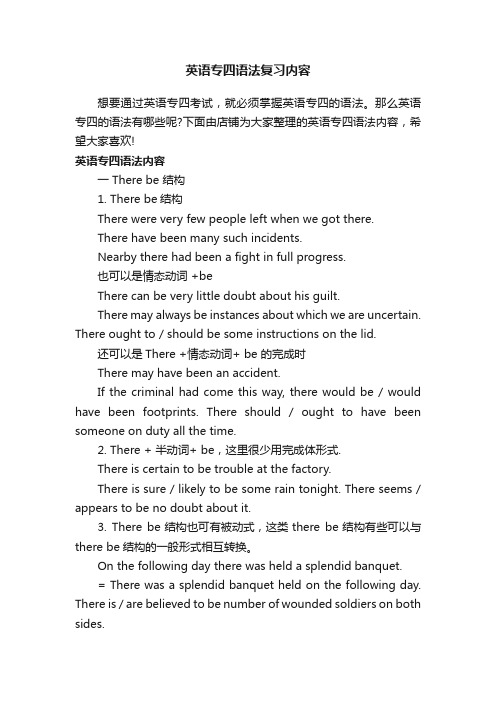
英语专四语法复习内容想要通过英语专四考试,就必须掌握英语专四的语法。
那么英语专四的语法有哪些呢?下面由店铺为大家整理的英语专四语法内容,希望大家喜欢!英语专四语法内容一 There be 结构1. There be结构There were very few people left when we got there.There have been many such incidents.Nearby there had been a fight in full progress.也可以是情态动词 +beThere can be very little doubt about his guilt.There may always be instances about which we are uncertain. There ought to / should be some instructions on the lid.还可以是There +情态动词+ be 的完成时There may have been an accident.If the criminal had come this way, there would be / would have been footprints. There should / ought to have been someone on duty all the time.2. There + 半动词+ be,这里很少用完成体形式.There is certain to be trouble at the factory.There is sure / likely to be some rain tonight. There seems / appears to be no doubt about it.3. There be结构也可有被动式,这类there be结构有些可以与there be结构的一般形式相互转换。
![英语专业四级考试语法精讲[1]](https://img.taocdn.com/s1/m/a66f1368561252d380eb6e8d.png)
英语专业四级考试—语法精讲虚拟语气第一部分:概述虚拟语气类型(宾语从句;状语从句;名词性从句(主语从句,同位语从句,表语从句);定语从句;特殊类型(感叹句);省略if 的虚拟法(倒装))ExamplesThe rapid change of society requires that college students adapt to the world outside campus by getting to know the society.I would rather that you did nothing for the time being.I wish that I were a student again.I wished that I had followed his suggestion.名词性从句中的虚拟主语从句(it is +adj./p.p that)同位语从句(The +n. that )表语从句(n. +be that)省略if 的虚拟法(倒装)(1)虚拟语气中如果从句引导词if / whether 省略,从句中需要倒装,提前助动词(系动词)或情态动词。
Eg. If it should rain tomorrow, we would not be able to have the sports meeting.=Should it rain tomorrow, we should not be able to have the sports meeting.省略if 的虚拟法(倒装)(2)Eg. Whether it (may) be fine or rainy, we would have the sports meeting. =Be it fine or rainy, we would have the sports meeting.If she had been given more information, she could have answered the questions.=Had she been given more information, she could have answered the questions.第二部分详解&总结虚拟语气的动词标志―insist, suggest, require, request, demand, propose, prefer, maintain, move,urge, recommend, command, order‖等动词表“建议、愿望”时,其后宾语从句中谓语动词要用虚拟语气。
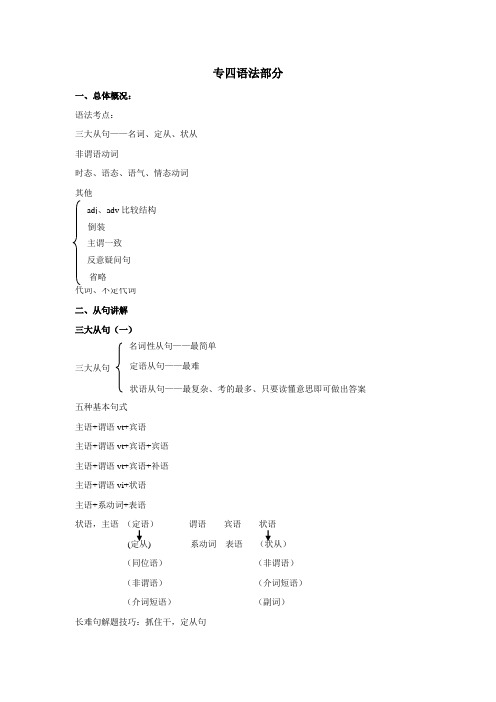
专四语法部分一、总体概况:语法考点:三大从句——名词、定从、状从非谓语动词时态、语态、语气、情态动词其他二、从句讲解三大从句(一)三大从句五种基本句式主语+谓语vt+宾语主语+谓语vt+宾语+宾语主语+谓语vt+宾语+补语主语+谓语vi+状语主语+系动词+表语状语,主语(定语)谓语宾语状语(定从) 系动词表语(状从)(同位语)(非谓语)(非谓语)(介词短语)(介词短语)(副词)长难句解题技巧:抓住干,定从句逗号原则:在英语句子中,逗号是不能连接两个独立完整的句子的。
名词性从句三大从句(二)两步解题法1.抓连词2.状从中的连接词——常考固搭so…that in order that such…that with the result that so thatthat引导名词性从句——that+完整句子(1)主语从句e.g. It is true that he passed the exam.It is said that he passed the exam.It is a pity that he didn’t pass the exam.强调句式It is/was+被强调部分+that+不完整句子主、宾、表、状e.g. I met him in the street.It was him that I met in the street.It was in the street that I met him.(2)宾语从句主+谓语vt+(that)+完整句子e.g. I know (that) he passed the exam.(3)表语从句主+系动词+that+完整句子e.g. My suggestion is that he go with us tomorrow.(4)同位语从句抽象名词+that+完整句子e.g. My suggestion that he go with us tomorrow.There is/are +抽象名词+that+完整句子Answer,belief,concept,conclusion,decision,discovery,doubt,evidence,sign,fact,hope,idea,informati on,knowledge,suggestion,thought,probability…On the condition that…Despite the fact that…On the understanding that…that 引导限定性定从all some any one(s) every each…the first the lastthe only the veryn+that+不完整句子作从句中的主、宾、表语e.g. The book that was written by him is pop.that引导同位语从句抽象名词+that+完整句子that 引导限定性定从n+that+不完整句子作从句中的主、宾、表语The fact that he passed the exam was true.The fact that he found was true.三大从句(三)What=all that; the thing that; the person thatWhat 只引导主从、宾从、表从,不能引导定从和同位从What+不完整句子What he said made me happy.e.g. _____it turned out,it was Italian movie.A What_____it turned out was Italian movie.A WhatI know what he said.I listen to what he said.This is what he said.词______+ 不完整句子n A what Xvt/介词/系动词 A what 可以考虑词,_______+不完整句子A whatB whichC thatwhat 与how 的区别I don’t know what to do.I don’t know how to do it.I’m thinking of ______to do about it.A.whatB. how介词短语在句子的位置1)作状语句子+介短/介短+句子2)作定语n+介短3)作表语系+介短wh—ever与no matter wh—区别让步、名从让步I don’t believe whatever he said.Whatever happens,don’t panic.公式however + adj/adv + 主语+ 谓语e.g. It caused them to think about _______they might control the experiences of children to duce responsible and productive adults.A. whatB. howC. whateverD. however if 与 whether 的区别 if_______about the university the mind, love, dreams, or ordering a drink. A) whatB) whether C) while D) if Never ask a child _______he likes or dislikes.A) what B) whether C) that D) which We know, however,________ no two places are exactly the same. A) Although B) whether C) since D) that 三大从句(四) 定语从句两步解题法1. 抓先行项(指人、物、整句话内容)2. 抓关系词在定语从句中的成分e.g. This is the house_______①I once lived.②I once visited.①where/in which②that/which/xThis is the very house_________ I once visited.e.g. I’ll never forget the day______①I met him.②I spent with him.①when/on which②that/which/xI’ll never forget the very day______ I spent with him. 地点n where 主+谓vt+宾/宾/宾补主+谓vi主+系+表时间n when 主+谓vt+宾/宾/宾补主+谓vi 主+系+表the reason why 主+谓vt+宾/宾/宾补 主+谓vi 主+系+表 三大从句(五)Which 在专四考试中,只考定语从句。
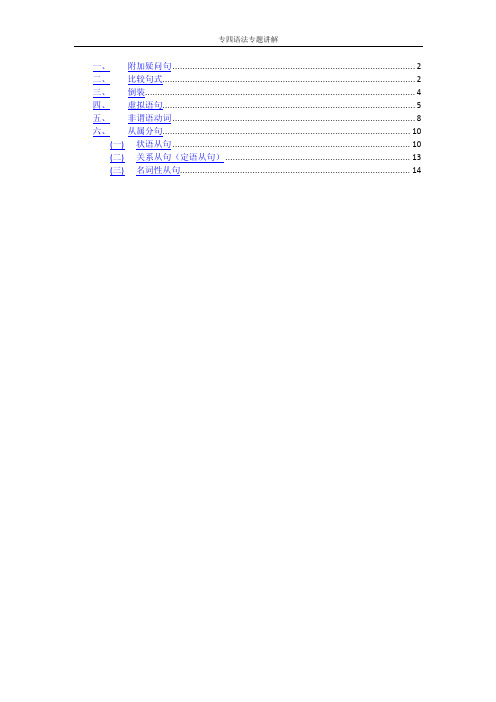
一、附加疑问句 (2)二、比较句式 (2)三、倒装 (4)四、虚拟语句 (5)五、非谓语动词 (8)六、从属分句 (10)(一)状语从句 (10)(二)关系从句(定语从句) (13)(三)名词性从句 (14)一、附加疑问句附加疑问句由两部分组成,前面是一个陈述句,后面是一个简短问句,下面分析几种特殊的附加疑问句形式:1. 如果陈述部分是祈使句,附加疑问句部分一般使用will you, w on’t you例如:Pass me some salt, won’t you?递给我一些盐,好吗?2. 如果陈述部分的主语是this, that, these, those时,附加疑问句部分的主语为it或they例如:This is exciting, isn’t it?这很令人兴奋,不是吗?3. 如果陈述部分是一个复合句,则分两种情况:1) 一般情况下,附加疑问句部分的主语应与陈述部分的主语保持一致,例如:Mary said her son would come, didn’t she? 玛丽说她的儿子要来,不是吗?2) 但如果陈述部分的主语是第一人称,且谓语动词是suppose, think, believe等,附加疑问句的主语则应该与从句的主语保持一致,例如:I think he will come, won’t he?我认为他会来,不是吗?4. 如果陈述部分是there be存在句,附加疑问句部分的主语也应该用there例如:There are some books, aren’t there?有一些书,不是吗?5. 如果陈述部分中带有否定词或半否定词,如never,hardly,scarcely,seldom,no,none,no one,rarely,nowhere,nothing,nobody,few,little等,附加疑问句的谓语要用肯定形式例如:There are rarely extremes of cold or heat in Britain, are there?英国很少出现严寒或酷暑天气,是吗?二、比较句式1. 形容词、副词比较级和最高级的用法1) 比较级修饰语(a) 比较级之前的副词修饰语常用many, much, far, a little, a bit, slightly, a great deal, a lot, somewhat, rather, etc.。

主谓一致主谓一致即句子的主语和谓语动词在人称和数上保持一致。
大致有三个基本原则:1.语法一致原则,即主语是单数形式,谓语动词也采用单数形式;主语如是复数形式,谓语动词则相应的为复数形式。
2.意义一致原则,即主语、谓语不参照主语的语法形式,而是取决与主语所表述的实际意义为单数还是复数。
3.就近原则,即谓语动词和它最相邻的名词、代词或其它词在人称或数上保持一致。
专四考点:1.语法一致✧当主语后面跟有with, together with, like, except, but, no less than, as well as等词引起的短语时,位于动词与前面的主语一致。
如:Tom as well as two of his classmates was invited to the party. 汤姆和他的两个同学被邀请去参加聚会。
The president of the college, together with the deans, is planning a conference for the purpose of laying down certain regulations. 该大学的校长准备和院长们一起开会制定校规。
✧如果主语是由“a committee of, a panel of, a/the board of + 复数名词”构成,谓语动词通常用单数。
如:A panel of scientific advisers to the agency is expected to make a formalrecommendation on Monday. 药监局的科学顾问小组将在周一提出正式建议。
The board of manager is responsible for the firm. 经理委员会对公司负责。
2.意义一致✧代词each和由every, some, no, any等构成的复合代词作主语,或主语中含有each, every,谓语需用单数。
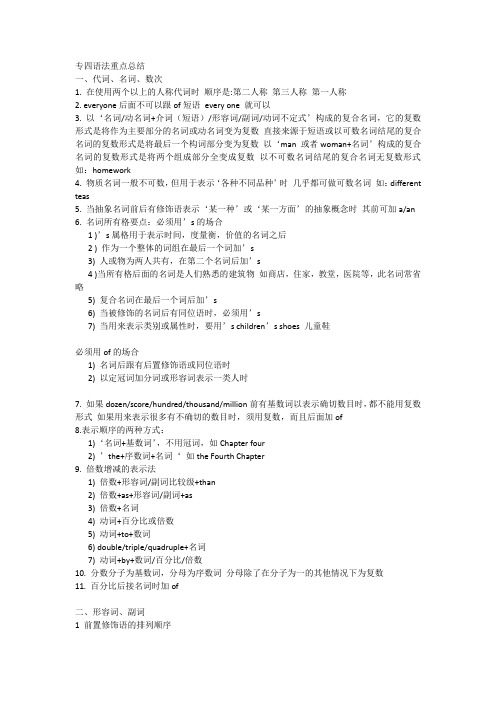
专四语法重点总结一、代词、名词、数次1. 在使用两个以上的人称代词时顺序是:第二人称第三人称第一人称2. everyone后面不可以跟of短语every one 就可以3. 以‘名词/动名词+介词(短语)/形容词/副词/动词不定式’构成的复合名词,它的复数形式是将作为主要部分的名词或动名词变为复数直接来源于短语或以可数名词结尾的复合名词的复数形式是将最后一个构词部分变为复数以‘man 或者woman+名词’构成的复合名词的复数形式是将两个组成部分全变成复数以不可数名词结尾的复合名词无复数形式如:homework4. 物质名词一般不可数,但用于表示‘各种不同品种’时几乎都可做可数名词如:different teas5. 当抽象名词前后有修饰语表示‘某一种’或‘某一方面’的抽象概念时其前可加a/an6. 名词所有格要点:必须用’s的场合1 )’s属格用于表示时间,度量衡,价值的名词之后2 ) 作为一个整体的词组在最后一个词加’s3) 人或物为两人共有,在第二个名词后加’s4 )当所有格后面的名词是人们熟悉的建筑物如商店,住家,教堂,医院等,此名词常省略5) 复合名词在最后一个词后加’s6) 当被修饰的名词后有同位语时,必须用’s7) 当用来表示类别或属性时,要用’s children’s shoes 儿童鞋必须用of的场合1) 名词后跟有后置修饰语或同位语时2) 以定冠词加分词或形容词表示一类人时7. 如果dozen/score/hundred/thousand/million前有基数词以表示确切数目时,都不能用复数形式如果用来表示很多有不确切的数目时,须用复数,而且后面加of8.表示顺序的两种方式:1)‘名词+基数词’,不用冠词,如Chapter four2) ’the+序数词+名词‘如the Fourth Chapter9. 倍数增减的表示法1) 倍数+形容词/副词比较级+than2) 倍数+as+形容词/副词+as3) 倍数+名词4) 动词+百分比或倍数5) 动词+to+数词6) double/triple/quadruple+名词7) 动词+by+数词/百分比/倍数10. 分数分子为基数词,分母为序数词分母除了在分子为一的其他情况下为复数11. 百分比后接名词时加of二、形容词、副词1 前置修饰语的排列顺序可以置于冠词前的形容词(all both such) -----冠词,指示形容词,所有格形容词,不定形容词(a an the this your his any some)-----------基数词(one ) 序数词(first)------------ 表示性质,状态,质量的形容词(good useful)--------------表示大小,长短,形状的形容词----------------表示年龄,新旧,温度的形容词------------表示颜色的形容词---------------------表示国籍,产地,区域的形容词-----------表示材料,用做形容词的名词----------动名词,分词2.后置修饰语由前缀a-构成的形容词3.形容词修饰由some-,any-,every-,no-,-body,-one,-thing等组成的复合不定代词时,必须后置4.enough作形容词修饰名词时既可放前又可放后,但当它作副词修饰形容词或副词时,必须后置5.有些形容词本身就有‘比……年长’,‘比……优等的意思这些形容词后面用介词to 而不用than6.much too 作为副词短语修饰形容词或副词,不修饰名词7.more 不能用来修饰比较级8.与名词连用的more of a .. ./ as much of a... / more of a.... 意为更像……9.as much of a……意为称得上,less of a 意为算不上10.none other than(不是别人,正是)=no other than11.any/sone/every与other连用时,其后若用可数名词,一般为单数三、情态动词、虚拟语气1.can 用于否定句cannot(help)but表示不能不,只能(but后跟不带to的动词不定式)2.must 表示禁止,一定不要时的否定式为mustn’t 当它表示有把握的推断时意为一定准是时它的否定形式为can’t3.need doing=need to be done 这个句型表示被动意味4.need not have done sth 表示本来没有必要做某事(经常考)虚拟语气1.It is (high/about/the)time... 谓语动词用过去式指现在或将来的情况表示早该做某事而现在已经有点晚了2.It is the first(second/third)time后的that从句中,谓语动词要用完成体来表示一种经验3.as if/though 的虚拟要点1) 对当时事实的假设,从句谓语用过去式,be动词一律用were2)对过去事实的假设,从句谓语用过去完成式3)对未来事实的假设,从句谓语用would+动词原型五、比较级比较等级的含义:英语中形容词与副词有三个比较等级,即原级,比较级和最高级。

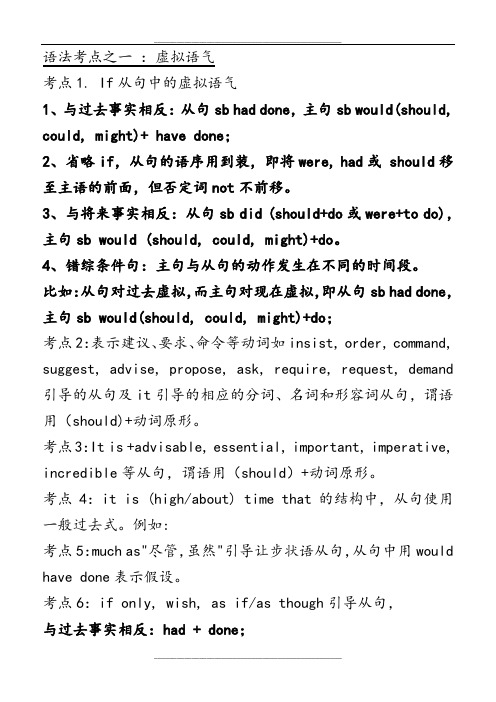
语法考点之一:虚拟语气考点1. If从句中的虚拟语气1、与过去事实相反:从句sb had done,主句sb would(should, could, might)+ have done;2、省略if,从句的语序用到装,即将were, had或 should移至主语的前面,但否定词not不前移。
3、与将来事实相反:从句sb did (should+do或were+to do),主句sb would (should, could, might)+do。
4、错综条件句:主句与从句的动作发生在不同的时间段。
比如:从句对过去虚拟,而主句对现在虚拟,即从句sb had done,主句sb would(should, could, might)+do;考点2:表示建议、要求、命令等动词如insist, order, command, suggest, advise, propose, ask, require, request, demand 引导的从句及it引导的相应的分词、名词和形容词从句,谓语用(should)+动词原形。
考点3:It is +advisable, essential, important, imperative, incredible等从句,谓语用(should)+动词原形。
考点4:it is (high/about) time that的结构中,从句使用一般过去式。
例如:考点5:much as"尽管,虽然"引导让步状语从句,从句中用would have done表示假设。
考点6:if only, wish, as if/as though引导从句,与过去事实相反:had + done;与现在事实相反:动词过去式;与将来事实相反:could/would + do考点7:would rather/sooner从句中使用一般过去式或过去完成式分别表示对现在或过去的虚拟考点8:lest / for fear that+(should ) +原形动词。

专四语法考点串讲语法回顾篇:专四语法考点虚拟语气、情态动词、非谓语动词、复合句、倒装、小语法(省略,时态,反义疑问句,代词,强调句,主谓一致,冠词,形容词及副词)、as 的特殊用法。
专四英语语法考点串讲之一虚拟语气一般说来,有下列几种考点需要考生注意(十考点及两备考点)考点1. 与现在事实相反从句谓语动词用did(be用were),主句谓语动词would(should,could,might)+do;考点2. 与过去事实相反从句谓语动词用had done,主句谓语动词用would(should,could,might)+ have done;例如:43.I _________the party much more if there hadn’t been quite such a crowd of people there.A. would enjoyB. will have enjoyedC. would have enjoyedD. will be enjoying49.All of us would have enjoyed the party much more if there _________ quite such a crowd of people there.A. weren’tB. hasn’t beenC. hadn’t beenD. wouldn’t考点3.与将来事实相反,从句谓语动词用:did(should+do或were + to do),主句谓语动词用:would(should,could,might)+do。
例如:43. If your car ___ any attention during the first 12 months, take it to an authorized dealer.(08年)• A. shall need C. would need• B. should need D. will need考点4. 时态的交叉现象,也就是主句与从句的动作发生在不同的时间段例如:If you had gone to see the doctor,you would be all right now.你要是早去看病,你现在就没事了。



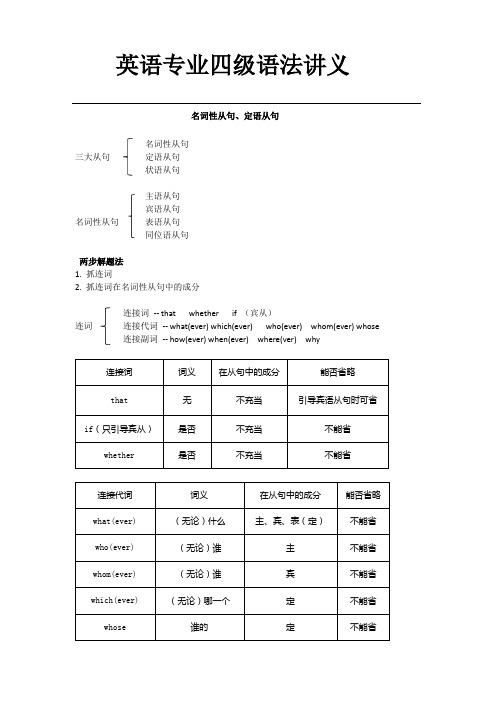
名词性从句、定语从句名词性从句 三大从句定语从句 状语从句 主语从句 宾语从句 名词性从句表语从句 同位语从句两步解题法 1.抓连词2.抓连词在名词性从句中的成分连接词 -- that whether if (宾从)连词连接代词 -- what(ever) which(ever) who(ever) whom(ever) whose 连接副词 -- how(ever) when(ever) where(ver) why英语专业四级语法讲义代词that名从中连接词--考与what的区别连词限定性定从中关代--考与which的区别强调句式--注意与主从的区别状从中连接词--常考固搭状从中的连接词--常考固搭so…that in order that such…that with the result thatso thatthat引导名词性从句--that + 完整句子(1)主语从句It is/was + adj.-ed+that +完整句子某些名词e.g. It is true that he passed the exam.It is said that he passed the exam.It is a pity that he didn’t pass the exam.*强调句式It is/was +被强调部分+ that +不完整句子主、宾、表、状e.g.I met him in the street.It was him that I met in the street.It was in the street that I met him.It was I that met him in the street.(2)宾语从句主+ 谓语vt + (that) + 完整句子e.g.I know (that) he passed the exam.(3)表语从句主+ 系动词+ that + 完整句子e.g. My suggestion is that he go with us tomorrow.(4)同位语从句抽象名词+ that + 完整句子e.g. My suggestion that he go with us tomorrow is right.There is /are + 抽象名词+ that + 完整句子*抽象名词answer, belief, concept, conclusion, decision, discovery, doubt, evidence, sign, fact, hope, idea, information, knowledge, statement, suggestion, thought, probability…on the condition that…despite the fact that…on the understanding that…代词that名从中连接词--考与what的区别连词限定性定从中关代--考与which的区别强调句式--注意与主从的区别状从中连接词--常考固搭that 引导限定性定从all some any one(s) every each …the first the last the only the veryN + that + 不完整句子作从句的主、宾、表语e.g. The book that was written by him is pop.that引导同位语从句抽象名词+ that + 完整句子that引导限定性定从N + that + 不完整句子作从句的主、宾、表语The fact that he passed the exam was true.The fact that he found was true.what = all that; the thing that; the person thatwhat + 不完整句子What he said made me happy.e.g. ____it turned out, it was Italian movie.A What____ it turned out was Italian movie.A WhatI know what he said.I listen to what he said.This is what he said.词___ + 不完整句子n A what Xvt /介词/系动词 A what 可以考虑词,___ + 不完整句子A whatB whichC thatwhat与how的区别I don’t know what to do .I don’t know how to do it.I’m thinking of __A__ to do about it.A.whatB.how介词短语在句中的位置1)作状语句子+介短/介短+句子2)作定语n + 介短3)作表语系+介短4)与vi连用形成固搭wh-ever 与no matter wh- 区别让步、名从让步I don’t believe whatever he said.Whatever happens, don’t panic.转折连词---找逗号“但是”however让步连词---找公式“无论如何”However, ,however,公式however + adj/adv + 主语+ 谓语e.g. It caused them to think about B___ they might control the experiences of children to produce responsible and productive adults.A.whatB.howC.whateverD.howeverif与whether的区别if 条件状从“如果”/宾从“是否”whether 让步状从“无论是否”名词性从句(主从、宾从、表从、同位从)“无论是否”whether…or not/…or...We know, however, __D__ no two places are exactly the same.A)although B)whetherC)since D)that定语从句:限定性定语从句/非限定性定语从句两步解题法1.抓先行项(指人、物、整句话内容)2.抓关系词在定语从句中的成分关系词:关系代词--作主、宾、表、定语关系副词--作状语e.g. This is the house ____①I once lived.②I once visited.①where / in which②that / which / XThis is the very house _that/x___ I once visited.e.g. I’ll never forget the day ___①I met him.②I spent with him.①when / on which②that / which / XI’ll never forget the very day _that/x__ I spent with him.地点N where 主+谓vt+宾/宾/宾补主+谓vi主+系+表时间N when 主+谓vt+宾/宾/宾补主+谓vi主+系+表the reason why 主+谓vt+宾/宾/宾补主+谓vi主+系+表词___ + 句子A whatB whichC that词,___ + 句子A whatB whichC thatN 介词+ which+主+谓+宾介词+ whom+主+谓+宾The food __on _ which he depends is expensive.We need a chairman ___in__ whom we have confidence.have confidence inbe confident ofWe were struck by the extend _to__ which the teacher’s decision served the interests of the school rather than those of the students.I listen to what he said.…set at ___C__ they would be if ….A whichB thatC whatD whoAs ①固定搭配②介词与like区别③原因状从④比较状从⑤方式状从⑥让步倒装⑦时间状从⑧定语从句as引导的限定性定语从句such…as (不完整句子)the same…as(不完整句子)注意与such …that区别such …that(完整句子)e.g. It wasn’t such a good dinner _B__ she had promised us.A.thatB.asC.whichD.whatpromise to do/promise sb sthe.g. There was such a long line at the exhibition _A___ we had to wait for about an hour.A.thatB.asC.soD.hencewait for me for a long timee.g. It is language _B___ distinguishes man from the rest of the animal world.A.whatB.thatC.aswhose 表所属关系“…的”n + (,)whose + n.I know a girl whose name is Mary.I like the room whose window faces the south.The book, the cover _B__ is broken, isn’t mine.A whose B. of whichThe book , __A__ cover is broken, isn’t mine.A.whoseB.of which名从、定从真题练习04年43.The government has promised to do ________ lies in its power to ease the hardships of the victims in the flood-stricken area.[A]however[B]whichever[C]whatever[D]wherever03年43.Above the trees are the hills, ____ magnificence the river faithfully reflects on the surface.[A]where [B] of whose[C]whose[D]which51.They overcame all the difficulties and completed the project two months ahead of time, ____ is something we had not expected.[A]which[B]it[C]that[D]what52.He is quite worn out from years of hard work. He is not the man ____ he was twenty years ago.[A]which[B]that[C]who[D]whom02年44.Have you ever been in a situation ___ you know the other person is right yet you cannot agree with him?[A]by which [B] that [C] in where [D] where45.We’ve just installed two air-conditioners in our apartment, ___should make great differences in our life next summer.[A]which[B]what[C]that[D]they01年42.Even as a girl, ______ to be her life, and theater audiences were to be her best teacher.[A]performing by Melissa were[B]it was known that Melissa’s performances were[C]knowing that Melissa’s performances were[D]Melissa knew that performing was44.There is no doubt ______the company has made the right decision on the sales project.[A]why [B] that[C]whether [D] when45.Intellect is to the mind ______sight is to the body.[A]what [B] as[C]that [D]like08年53.Nine is to three _____ three is to one.A.whenB.thatC.whichD.what62.Quality is ____ counts most.A.whichB.thatC. whatD.where09年56.I was very interested in _____ she told me.A.all thatB.all whichC.all whatD.that10年54.After ______ seemed an endless wait, it was his turn to enter the personnel manager's office.A.thatB.itC.whatD.there11年63.There is no doubt ________ the couple did the right thing in coming back home earlier than planned.A.whetherB.thatC.whyD.when参考答案:C.C. A. B. D A.D. B. A. D. C.A. C. B.状语从句状语从句让步状从although though even if / thougheven adv.Even 句子,句子XEven they get the answers right, some are just guessing. Xas引导的让步倒装adj.adv.n (无冠词) as + 主+谓分词短语表让步Although/Though 句首While 表转折but 句中当……时候46.____C__ I sympathize, I can’t really do very much to help them out of the difficulties.[A]As long as[B]As[C]While[D]Evenwh-ever 与no matter wh- 区别让步、名从让步whether…or not/or省略whether倒装Whether he is busy or free, he still keeps on studying English.Be he busy or free, he still keeps on studying English.42.____D____, I’ll marry him all the same.[A]Was he rich or poor [B] Whether rich or poor[C]Were he rich or poor [D] Be he rich or poordespite = in spite of介词介短条件状从if与whether的区别unless = if…notas long as=so long ason condition thatin the event that42.This is an illness that can result in total blindness ___B___ left untreated.[A]after[B]if[C]since[D]unlessprovided (that)= providing (that)= suppose (that)= supposing (that)__B_ I have enough money, I’ll visit Europe next year.A.ImagineB.SupposeC.ProvideD.Givein case:主+ do/does主+ should doin case of时间状从when while as 区别(2)Hardly haveScarcely+has+主+ done + whenhadhave(3)No sooner+has+主+ done + thanhad60.The couple had no sooner got to the station __D___ the coach left.A.whenB. asC.untilD.thanThis means that no sooner has he got used to one routine (33)______D__ he has to change to another, so that much of his time is spent neither working nor sleeping very efficiently.33.[A] as[B]when[C]then[D]thanas soon as=the instant=the minute=the momentby the timeevery time each timesince (自从)过去时间点主+ have/has –ed + since过去时句子till/until not …untilonce ①adv “曾经”②连词“一旦”before after then结果状从目的状从so…that with the result thatsuch…that so thatso that in order thattherefore consequently thus so原因状从because = in thatsince = now thatas forbecause of due toowing to thanks to54.Men differ from animals _C___ they can think and speak.A.for whichB. for thatC.in thatD.in which地点状从where wherever anywhere somewhereStay where you are.注意与定语从句的区别This is the house where I once lived.注意when引导的时间状从与定从的区别I’ll never forget the day when I met him.08年56.I enjoyed myself so much _B.____ I visited my friend in Pairs last year.A thatB whenC whereD which比较状从as…as, thanas … as possible = as … as one canthan:比较状从定语从句比较级+ than + 完整句子He ran faster than I did.比较级+ (n)+ than + 不完整句子方式状从as just asI have changed it as you suggested.注意与非限定性定语从句的区别I have changed it, as you suggested.41.She did her work ___A____ her manager had instructed.[A]as[B]until[C]when[D]though状从真题练习07年51.There are as good fish in the sea _____ever came out of it.[A]than[B]like[C]as[D]so61.The research requires more money than _____.[A]have been put in[B]has been put in[C]being put in[D]to be put in04年49.The experiment requires more money than____.[A]have been put in[B]being put in[C]has been put in[D]to be put in06年51.__________ dull he may be, he is certainly a very successful top executive.[A]Although [B]Whatever[C]As [D]However03年45.—Does Alan like hamburgers?—Yes. So much ____ that he eats them almost every day.[A]for[B]as[C]to[D]so49.____ I like economics, I like sociology much better.[A]As mush as[B]So much[C]How much[D]Much as08年55.____ he wanted to go out with his friends at the weekend, he had to stay behind to finish his assignment.A.Much thoughB.Much asC.As muchD.Though much60.They stood chatting together as easily and naturally as ____.A.it could beB.could beC.it wasD.was09年54._____ the boss says, it is unreasonable to ask me to work overtime without pay.A.WhateverB.WheneverC.WhicheverD.However08年56.I enjoyed myself so much ____ I visited my friends in Paris last year.A.whenB.whichC.thatD.where01年49.Barry had an advantage over his mother ______ he could speak French.[A]since that [B] in that[C]at that[D]so that参考答案:C.B. C.D. D. D.B. A. A. A. B.虚拟虚拟语气与情态动词1.if引导的虚拟语气(1)省略if 的虚拟倒装※had + 主语(not )done ※should + 主语 + do ※were +主语+ to do (2)含蓄虚拟without = but forwith(3)错综(混合)虚拟2.其他形式虚拟(1)wish / wished①过去式主 ②would/could + do③had done / would/could + have done (2)as if / as though①过去式主 ②would/could + do③had done / would/could + have done (3)if only①过去式主②would/could + do③had done / would/could + have done(4)would rather = ’d rather 主①过去式②had done /would/could + have donewould rather do / not do(5)用表示建议、命令、要求等词引导的名词性从句中that + 主语+(should)do+(should)be done两步解题方法:①圈出标志词(表建议、命令、要求的词)②选出动词原形suggest/-ed/-ion propose/-d/-sal order/-ed ask/-ed require/-d/-ment request/-eddesire/-d/-rable demand/-ed command/-edinsist/-ed/-ent/-ence recommend/-ed/-ation move/motion urge/-ent direct/-edadvise/-ce/-able important vitalessential necessary imperative(6)It's/was + timehigh time+that +主+ didabout time(7)lest (that)for fear that+主语+ should + do(in case)in case 主+ do/dose主+ should do(8)跳层虚拟真实,otherwise / or + 虚拟虚拟,but + 真实真实—过去时/ must have done虚拟—would / could + have done3.情态动词+ have donemust + have donecan / could + have donemay / might + have doneshould / ought to + have doneshouldn't / oughtn't to + have doneneedn't + have donemust: 表命令“必须”表推测“一定”need: 情态动词“必要”+ do实义动词“需要”+ to doneed doing = need to be done虚拟语气真题14年51.It is essential that he ________ all the facts first.A.is examiningB.will examineC.examinesD.examine55.Which of the following sentences indicatesPOSSIBILITY?A.The moon cannot always be at the full.B.You cannot smoke inside the building.C.He cannot come today.D.She cannot play the piano.13年54.Which of the following sentences contains subjunctive mood?A.Lucy insisted that her son get home before 5 o’clock?B.She used to drive to work, but now she takes the city metro.C.Walk straight ahead, and don't turn till the second traffic lights.D.Paul will cancel his flight if he cannot get his visa by Friday.63.If it ____ tomorrow, the match would be put off.A.were to rainB.was to rainC.was rainingD.had rained12年54.My boss ordered that the legal documents ____ to him before lunch.A.be sentB.were sentC.were to be sentD.must be sent11年61.It's getting late. I'd rather you _______ now.A.will leaveB. are leavingC.leaveD.left10年52.Nancy's gone to work but her car's still there. She __________ by bus.A.must have goneB.should have goneC.ought to have goneD.could have gone60.It is necessary that he ___ the assignment without delay.A.hand inB.hands inC.must hand inD.has to hand in09年52.If there were no subjunctive mood, English _____ much easier to learn.A.could have beenB.would beC.will beD.would have been53.She ____ fifty or so when I first met her at a conference.A.had beenB.must beC.has beenD.must have been61.Aren’t you tired? I ___ you had done enough for today.A.should have thoughtB. must have thoughtC.might have thoughtD. could have thought08年52.Had Judy been more careful on the maths exam, she ____ much better results now.A.would be gettingB.could have gotC.must getD.would get65.Which of the following sentences expresses "probability"?A.You must leave immediately.B.You must be feeling rather tired.C.You must be here by eight o'clock.D.You must complete the reading assignment on time.07年54.If only the patient ______a different treatment instead of using the antibiotics, he might still be alive now.[A]had received[B]received[C]should receive[D]were receiving60.He would have finished his college education, but he _______to quit and find a job to support his family.[A]had had [B] has [C] had [D] would have65.It is absolutely essential that William ________his study in spite of some learning difficulties.[A]will continue[B]continued[C]continue[D]continues06年52.If only I ____._____ play the guitar as well as you![A]would [B]could[C]should [D]might54.It’s high time we __________ cutting down the rainforests.[A]stopped [B]had to stop[C]shall stop [D]stop59.It is imperative that the government _______ more investment into the shipbuilding industry.[A]attracts [B]shall attract[C]attract [D]has to attract05年51.If you explained the situation to your solicitor, he ________ able to advise you much better than I can.[A]would be[B]will have been[C]was[D]were60.That was not the first time he ________ us. I think it’s high time we ________ strong actions against him.[A]betrayed…take[B]had betrayed…took[C]has betrayed…took[D]has betrayed…take63.__ you ____ further problems with your printer,contact your dealer for advice.[A]If, had[B]Have, had[C]Should, have[D]In case, had04年46.It is imperative that students ______ their term papers on time.[A]hand in[B]would hand in[C]have to hand in[D]handed in02年50._______ for the fact that she broke her leg, she might have passed the exam.[A]Had it not been[B]Hadn’t it been[C]Was it not[D]Were it not51.“What courses are you going to do next semester?”“I don’t know. But it’s about time ___on something.”[A]I’d decide[B]I decided[C]I decide[D]I’m deciding00年48.You _______ Jim anything about it. It was none of his business.[A]needn’t have told[B]needn’t tell[C]mustn’t have told[D]mustn’t tell49.All of us would have enjoyed the party much more if there ______ quite such a crowd of people there.[A]weren’t[B]hasn’t been[C]hadn’t been[D]wouldn’t be参考答案:D A A A A D A A B D A D B A C C B A C A B C A A B A C时态、语态时态、语态常考时态、语态1.现在完成进行时have/has been doing(1)表示一个动作发生在过去,一直延续下去(2)现在完成进行时与现在完成时的区别①现在完成时表动作已经完成;现在完成进行时表动作还在继续②现在完成时表动作已经一次性完成;现在完成进行时表动作反复发生③如果动作表示状态,应用现在完成时2.进行时be + doing①表示正在进行的动作②即将发生的动作③与always, for ever, constantly,continually等adv连用,表示说话人的某种情绪How can I ever concentrate if you _C__ continually ___ me with silly questions?A.have, interruptedB.had, interruptedC.are, interruptingD.were, interrupting3.表示将来的一般现在时①在时间状从和条件状从中②表计划好、安排好的事情be to do时态、语态真题练习13年58.All the following sentences definitely indicate future time EXCEPTA.Mother is to have tea with Aunt Betty at four.B.The President is coming to the UN next week,C.The school pupils will be home by now.D.He is going to email me the necessary information.07年55.Linda was _____the experiment a month ago, but she changed her mind at the last minute.[A]to start[B]to have started[C]to be starting[D]to have been starting58.The committee has anticipated the problems that ________in the road construction project.[A]arise[B]will arise[C]arose[D]have arisen59.The student said there were a few points in the essay he _______impossible to comprehend.[A]had found [B] finds[C]has found [D] would find05年54.J ames has just arrived, but I didn’t know he _________ until yesterday.[A]will come[B]was coming[C]had been coming[D]came55._________ conscious of my moral obligations as a citizen.[A]I was and always will be[B]I have to be and always will be[C]I had been and always will be[D]I have been and always will be02年43.For some time now, world leaders _______ out the necessity for agreement on arms reduction.[A]had been pointing [B] have been pointing[C]were pointing[D]pointed08年63.In his plays Shakespeare _____ his characters live through their language.A.would makeB.had madeC.madeD.makes参考答案:C B B A B D B D反意问句反意问句前肯,后否前否,后肯否定形式:no not never little few seldom scarcely hardly rarely祈使句祈使句否定,will you?祈使句肯定, won’t you?句子的主语是this, that, these, those时,反意问句的主语为it, theyThis is a book, ______?复合句中的反意问句,有两种情况:①反意问句的主语应与主句主语一致Mary said her son would come, ___________?②主句的主语是I/We,谓语是think/believe/suppose时,反意问句主语应与从句主语一致I don’t think he’ll come, ________?there be结构的反意问句,反意问句主语用thereThere used to be…, didn’t there?There used to be…, usedn’t there?反意问句真题练习10年57.She seldom goes to the theatre, __________?A.doesn't sheB.does sheC.would sheD.wouldn't she08年58.When you have finished with that book, don't forget to put it back on my desk, ____?A.do youB.don't youC.will youD.won't young与11年54题考一样06年65.There used to be petrol station near the park,______ ?[A]didn’t it [B]doesn’t there[C]usedn’t it [D]didn’t there03年53.She would have been more agreeable if she had changed a little bit, ____?[A]hadn’t she[B]hasn’t she[C]woul dn’t she[D] didn’t she00年44.Do help yourself to some fruit, ______ you?[A]can’t[B]don’t[C]wouldn’t[D]won’t参考答案:B C D C D形容词、副词adj / adv比较结构倍数表达法:基数词+timesonce twice three times分数表达法:分子用基数,分母用序数;分子大于1,分母+S2/3 two-thirds倍数在句中的应用※主+谓+倍数/分数+as + adj + as※主+谓+倍数/分数+the size (amount /length /price…) of※主+谓+倍数/分数+adj/adv比较级+than※increase/decrease by+倍数/分数具有比较意义的adj两个特点:(1)不能与more,-er连用(2)不能与than连用, 只能与to连用superior to inferior tosenior to junior toprior to = before sensitive tosecond to preferable to含有最高意义的adjabsolute unique round right wrong correct perfect outstanding结构:be + of + a + nbe + much + of + a + nbe + more + of + a + n + thanbe + as + much + of + a + n + asadj / adv 比较级、最高级用法一些特殊的比较结构①the more…, the more…“越…越”e.g. The harder you study, the more progress you’llmake.②(not) so/as…as“如同…一样,不如…”e.g. It is not so/as good as it looks.③the same…as / the same as “和…一样”e.g. She looks just the same as before.I got the same feeling as you did.④no more A than BA not…any more than B“正如A不能…B也不能”;“和…一样不”A fool can no more see his own folly than he can see his ears.no less…than “不比…差”⑤not A so much as Bnot so much A as Bnot more …A than B“与其说A不如说B”;“是B,而不是A”He is not so much a writer as a reporter.形容词、副词真题练习14年62.Which of the following italicized parts modifies anadverb?A.I rather like my teacher.B.That was a very funny film.C.Do it right now.D.We walked about 6 miles.11年56.Which of the following italicized phrases is INCORRECT?A.The city is now ten times its original size.B.I wish I had two times his strength.C.The seller asked for double the usual price.D.They come here four times every year.09年55.A new laptop costs about _____ of a second-hand one.A.the price of three timesB.three times the priceC.as much as the three times priceD.three times more than the price08年64.The square itself is five hundred yards wide, five times ____ the size of St. Peter's in Rome.A./B.that ofC.which isD.of07年51.There are as good fish in the sea _____ever came out of it.[A]than [B] like [C] as[D]so57.It is not ______much the language as the background that makes the book difficult to understand.[A]that [B] as [C] so [D]very11年57题、99年45题考的一样62.Overpopulation poses a terrible threat to the human race. Yet it is probably ________a threat to the human race than environmental destruction.[A]no more[B]not more[C]even more[D]much more06年64.It was __________ we had hoped.[A]more a success than[B]a success more than[C]as much of a success as[D] a success as much as05年59.Do you know Tim’s brother? He is ____ than Tim.[A]much more sportsman[B]more of a sportsman[C]more of sportsman[D]more a sportsman04年41.That trumpet player was certainly loud. But I wasn’t bothered by his l oudness ________ by his lack of talent.[A]so much as[B]rather than[C]as[D]than01年48.He was ______to tell the truth even to his closest friend.[A]too much of a coward[B]too much the coward[C]a coward enough[D]enough of a coward参考答案:C B B A C C B C B A A非谓语to do / not to do 非谓语 doing / not doingdone形式(时态、语态)注意:①to do 一般式表示动作与主句的谓语动作同时发生。



英语专业四级语法专题讲解英语专业四级考试对于语法知识的要求非常高,只有掌握了扎实的语法基础,才能够在考试中取得好成绩。
本文将针对英语专业四级考试中常见的语法问题进行分析和讲解,帮助考生更好地应对考试。
一、时态时态是英语语法中的基础知识,常出现在四级考试的试题中。
英语中常见的时态有一般现在时、一般过去时、一般将来时、现在进行时、过去进行时、现在完成时等,每种时态都有其特定的用法和表示方式。
1. 一般现在时一般现在时表示经常性或习惯性的动作,也可以表示客观事实等。
例句1:I usually get up at 7 o'clock in the morning.例句2:Water boils at 100 degrees Celsius.2. 一般过去时一般过去时表示在过去某个时间发生的动作或存在的状态。
例句1:I watched a movie last night.例句2:He lived in Paris for two years.3. 一般将来时一般将来时表示将要发生的动作或存在的状态,常与表示将来的时间状语连用。
例句1:I will visit my grandparents next weekend.例句2:She is going to travel around the world after graduation.4. 现在进行时现在进行时表示现在正在进行的动作。
例句1:They are studying in the library now.例句2:I am reading a book at the moment.5. 过去进行时过去进行时表示过去某个时间正在进行的动作。
例句1:She was cooking dinner when I arrived home.例句2:I saw him while he was walking in the park.6. 现在完成时现在完成时表示过去发生的动作对现在造成的影响或结果。
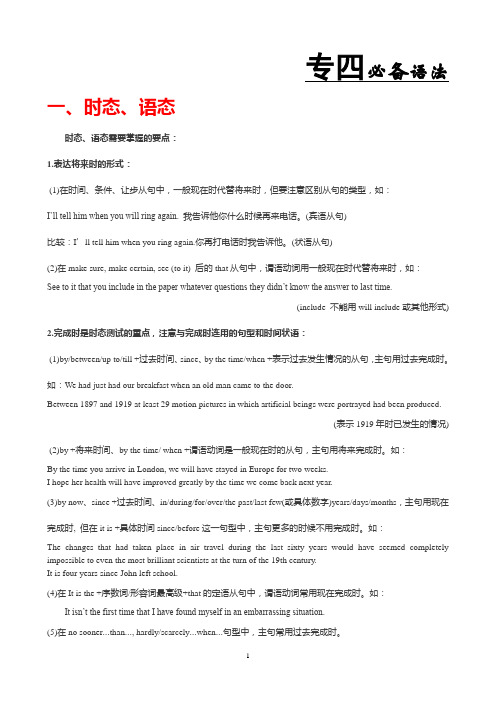
专四必备语法一、时态、语态时态、语态需要掌握的要点:1.表达将来时的形式:(1)在时间、条件、让步从句中,一般现在时代替将来时,但要注意区别从句的类型,如:I’ll tell him when you will ring again. 我告诉他你什么时候再来电话。
(宾语从句)比较:I’ll tell him when you ring again.你再打电话时我告诉他。
(状语从句)(2)在make sure, make certain, see (to it) 后的that从句中,谓语动词用一般现在时代替将来时,如:See to it that you include in the paper whatever questions they didn’t know the answer to last time.(include 不能用will include或其他形式) 2.完成时是时态测试的重点,注意与完成时连用的句型和时间状语:(1)by/between/up to/till +过去时间、since、by the time/when +表示过去发生情况的从句,主句用过去完成时。
如:We had just had our breakfast when an old man came to the door.Between 1897 and 1919 at least 29 motion pictures in which artificial beings were portrayed had been produced.(表示1919年时已发生的情况) (2)by +将来时间、by the time/ when +谓语动词是一般现在时的从句,主句用将来完成时。
如:By the time you arrive in London, we will have stayed in Europe for two weeks.I hope her health will have improved greatly by the time we come back next year.(3)by now、since +过去时间、in/during/for/over/the past/last few(或具体数字)years/days/months,主句用现在完成时, 但在it is +具体时间since/before这一句型中,主句更多的时候不用完成时。
完整版专四英语语法考点语法考点之一:虚拟语气考点1. If从句中的虚拟语气1、与过去事实相反:从句sb had done,主句sb would(should, could, might)+ have done;2、省略if,从句的语序用到装,即将were, had或 should移至主语的前面,但否定词not不前移。
3、与将来事实相反:从句sb did (should+do或were+to do),主句sb would (should, could, might)+do。
4、错综条件句:主句与从句的动作发生在不同的时间段。
比如:从句对过去虚拟,而主句对现在虚拟,即从句sb had done,主句sb would(should, could, might)+do;考点2:表示建议、要求、命令等动词如insist, order, command, suggest, advise, propose, ask, require, request, demand引导的从句及it引导的相应的分词、名词和形容词从句,谓语用(should)+动词原形。
考点3:It is +advisable, essential, important, imperative, incredible等从句,谓语用(should)+动词原形。
考点4:it is (high/about) time that的结构中,从句使用一般过去式。
例如:考点5:much as"尽管,虽然"引导让步状语从句,从句中用would have done表示假设。
考点6:if only, wish, as if/as though引导从句,与过去事实相反:had + done;与现在事实相反:动词过去式;与将来事实相反:could/would + do考点7:would rather/sooner从句中使用一般过去式或过去完成式分别表示对现在或过去的虚拟考点8:lest / for fear that+(should ) +原形动词。
语法考点之二:情态动词*情态动词: will(愿意), shall(将), must(必须), can, may, would, should (应该), might, could, ought to, used to(过去常常), need(需要), dare(竟敢),have to(不得不)考试中,情态动词部分重点测试以下内容:(1)情态动词+行为动词完成式(表示推测)(2)某些情态动词的特殊用法考点1. 情态动词+have+过去分词结构表示推测(1) must have done表示推测过去某事“一定”发生了。
否定形式为:can’t / couldn’t have v-ed, 表示过去不可能发生某事。
(2) could have done表示推测过去某动作“很可能”发生了。
(3) may / might have done 表示推测过去某事“也许”发生了.(4) ought to / should have done 和ought not to / shouldn’t have done用于对已发生的情况表示“责备”、“不满”,分别表示“本应该…”和“本不应该…”(5) needn’t have done 表示过去做了某事,但没有做的必要,意为“本没必要…”。
*did not need to do 动作并没发生。
考点2. 特殊用法(1) should 表示惊讶1. I am surprised__ this city is a dull place to live in.2006A. that you should thinkB. by what you are thinkingC. that you would thinkD. with what you were thinking(2) Can’t but + V.,表示不得不,与have to同义。
Can’t help +Ving忍不住。
(3) cannot … too / enough 表示“无论怎么……也不算过分”、“越……越好”(4) may/ might as well + 动词原形”意为“最好,满可以,倒不如”,相当于had better(5) may well + 动词原形”,意为“(完全)能,很可能”(6) may as well as还是…好了语法考点之三:非谓语动词(1) 考察哪些动词接不定式;(2) 考察哪些短语接不带to的不定式;Had better/had bestWould rather/would rather … than/rather than/would sooner/would sooner…thanCannot but/cannot help but/do nothing but/do nothing besides/do nothing thanWhy引导的疑问句(3)考察动词不定时的时态和语态:进行式to be doing,完成式to have done;一般式被动语态to be done;完成式被动语态to have been done。
另外,不定式短语有将来时的意思;考点2:动名词(1)常接动名词做宾语的词:mind(介意), miss(逃过), mention(提及), prevent, postpone, practice,risk(冒险), resist(抵制), consider(考虑), admit(承认), avoid(避免), appreciate(感激), fancy(幻想), finish(完成),feel like(喜欢), escape(逃脱), ensure(确保) , delay(延迟), deny(否认), resent, detest, imagine(想象), suggest(建议)(2)介词后的ing:prevent/stop/keep sb /sth from doing 阻止…做…spend/waste time /money in doing 在做…方面花钱、浪费时间或金钱;how /what about doing sth 做…怎么样了?Have some difficulty/trouble in doing 在…方面有些困难;There is no sense in doing (做…是没有理由的)Thank / admire /praise/blame /scold/ punish sb for doing sth因做某事而感谢、羡慕、表扬、责备、惩罚某人(3)接动名词做介词to 的宾语:apply oneself to致力于;be accustomed to习惯于;confess to供认;come to谈到;devote oneself to献身于;get down to着手做;give way to 对…让步;lead to导致;look forward to期待;next to几乎;object to反对;pay attention to注意;stick to坚持;stand up to勇敢面对;turn to求助于;be used to习惯于考点3:分词(1)从语态上看,现在分词一般表主动,过去分词一般表被动;(2)从时态上看,现在分词表示进行,过去分词表示过去。
如果分词动作发生在句子谓语动词动作之前,分词用完成时。
(3)现在分词的否定形式是not放在分词之前。
*非谓语动词解题三步曲:一、首先确定主句;二、分析主动被动;三、分析动作先后1. _____ should not become a serious disadvantage in life and work.2010A. To be not tallB. Not being tallC. Being not tallD. Not to be tall2. "The man preparing the documents is the firm's lawyer" has all the following possible meanings EXCEPT . 2009A. the man who has prepared the documents...B. the man who has been preparing the documents...C. the man who is preparing the documents...D. the man who will prepare the documents...3. ______ at in this way, the situation does not seem so desperate.2000A. LookingB. lookedC. Being lookedD. to look4. If not ____ with the respect he feels due to him, Jack gets very ill-tempered and grumbles all the time.2004A. being treatedB. treatedC. be treatedD. having been treated5. ______, he can now only watch it on TV at home. 1998A. Obtaining not a ticket for the matchB. Not obtaining a ticket for the matchC. Not having obtained a ticket for the matchD. Not obtained a ticket for the match6. He wasn’t asked to take on the chairmanship of the society, ______insufficiently poplar with all members.1996A. having consideredB. was consideredC. was being consideredD. being considered7. He noticed the helicopter hovering over the field. Then to his astonishment, he saw a rope ladder______ out and three men climbing down it. 1995A. throwingB. being thrownC. having thrownD. having been thrown8. This missile is designed so that once _____nothing can be done to retrieve it.1995A. firedB. being firedC. they firedD. having fired考点4:独立主格(句中没有连接词,逗号分开两个句子,存在两个主语。